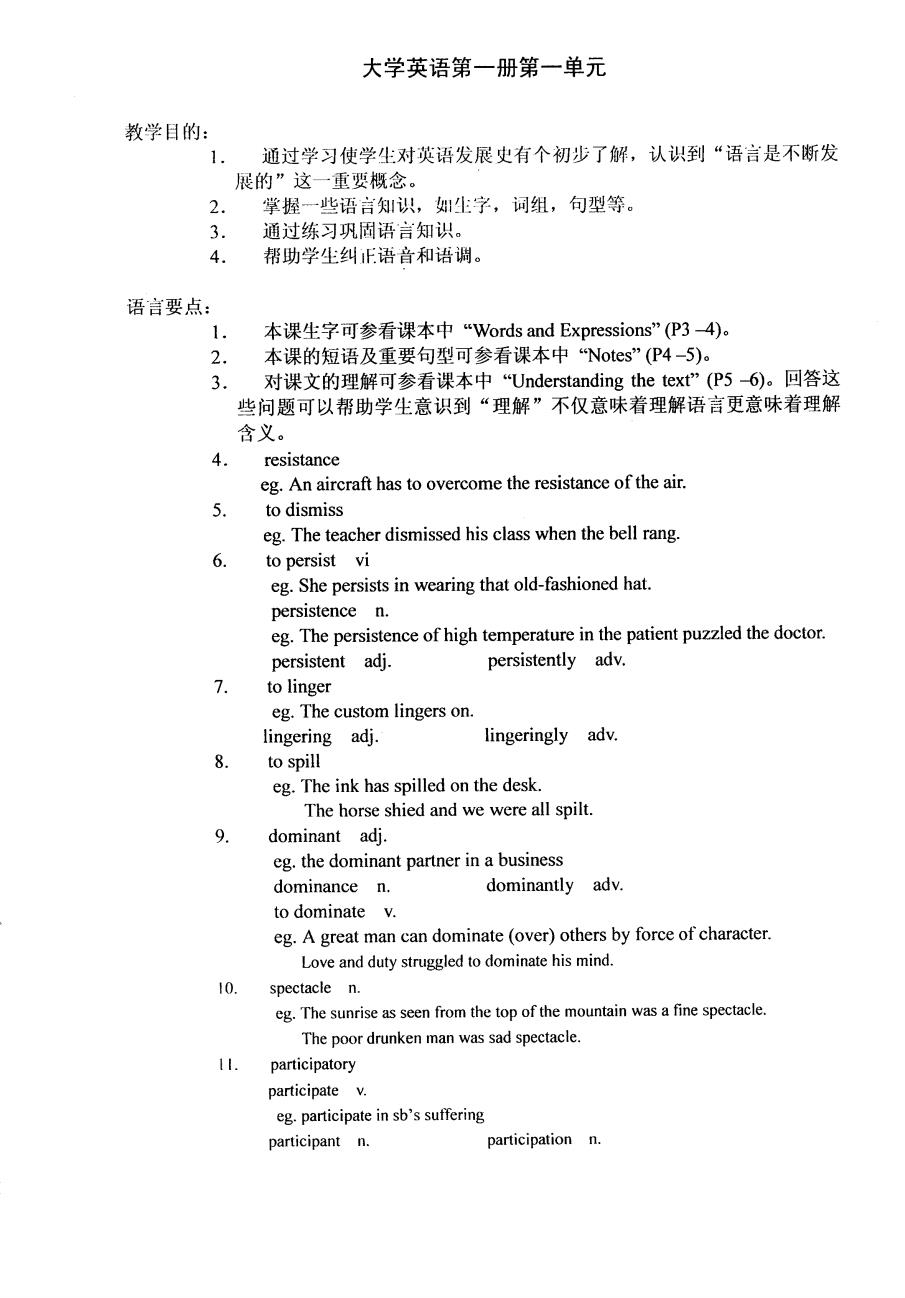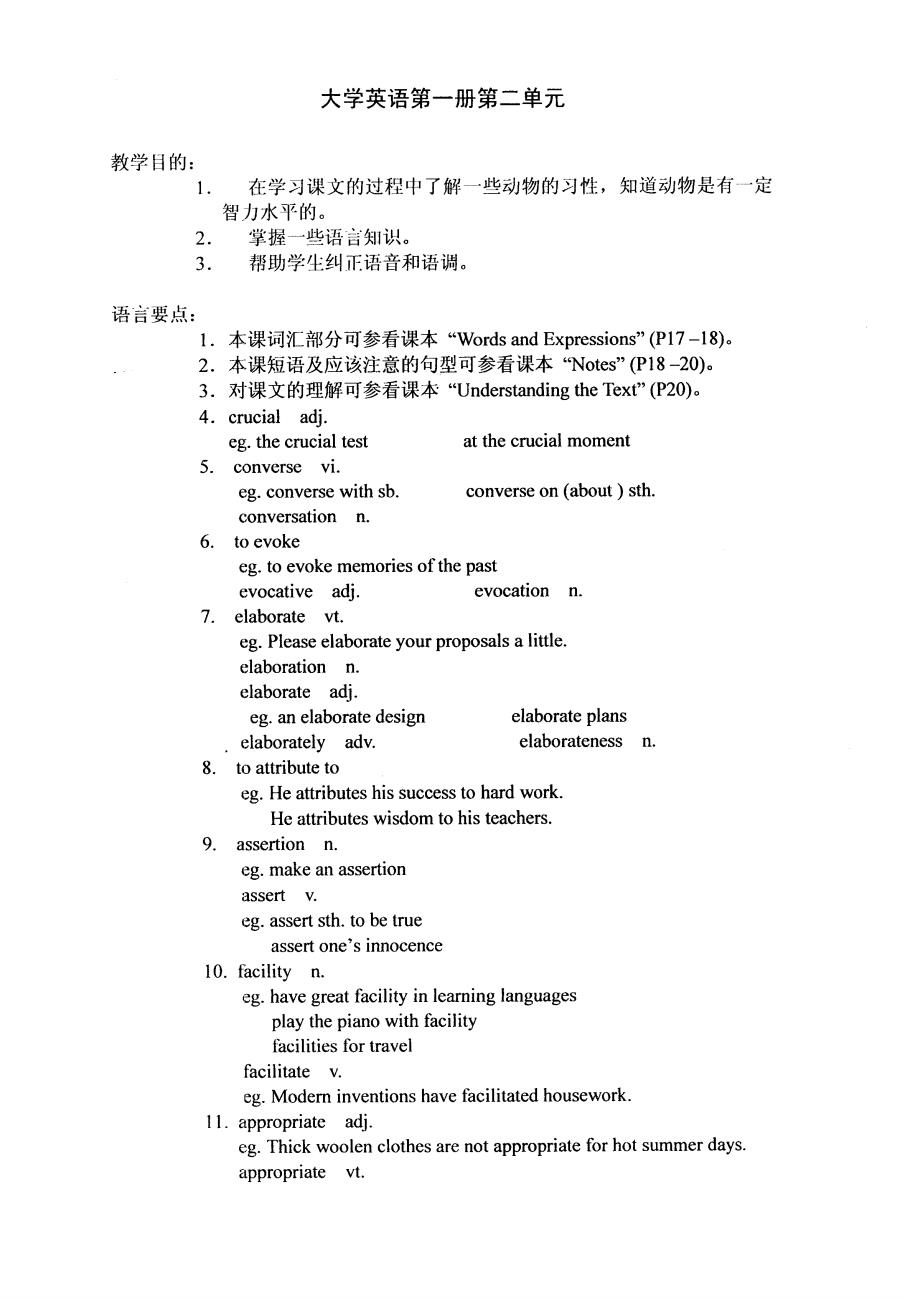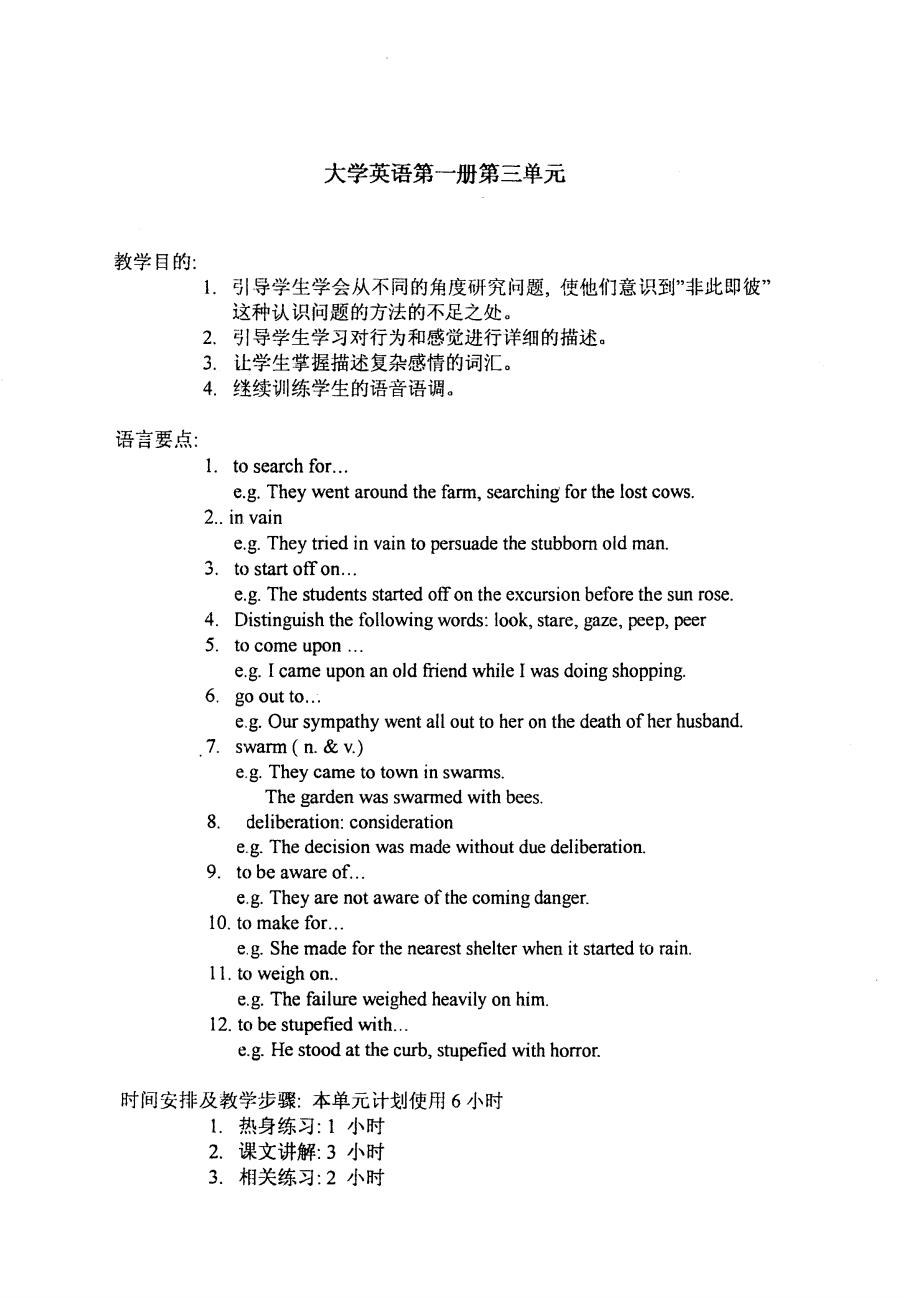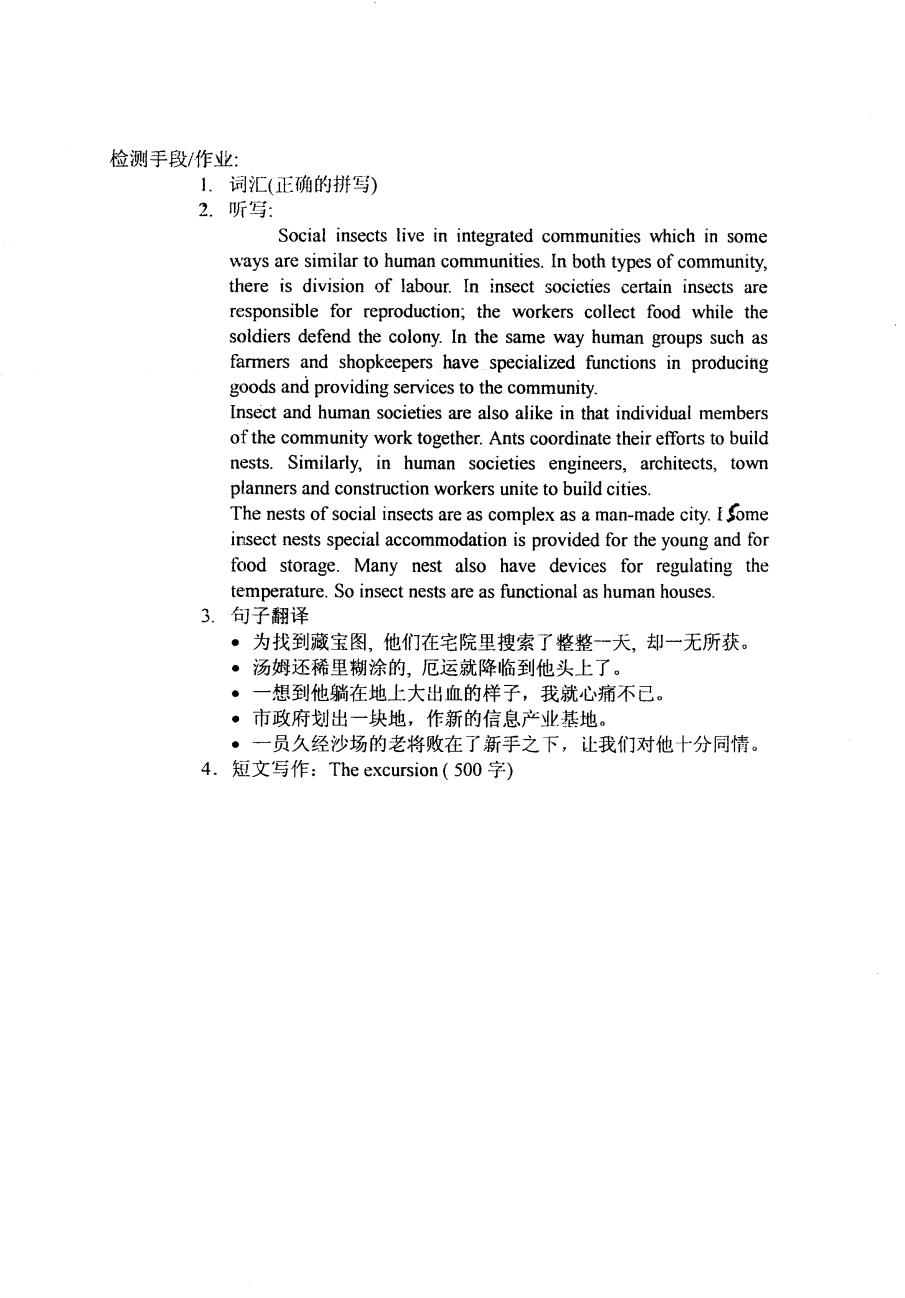
大学英语第一册第一单元 教学目的: 1. 通过学习使学生对英语发展史有个初步了解,认识到“语言是不断发 展的”这一重要概念。 2. 掌握一些语言知识,知尘字,词组,句型等。 3. 通过练习巩固语言知识。 4. 帮助学生纠语音和语调。 语言要点: 1. 本课生字可参看课本中“Words and Expressions'”(P34)。 2. 本课的短语及重要句型可参看课本中“Notes”(P4-5)。 3. 对课文的理解可参看课本中“Understanding the text'”(P56)。回答这 些问题可以帮助学生意识到“理解”不仅意味着理解语言更意味着理解 含义。 4. resistance eg.An aircraft has to overcome the resistance of the air. 5. to dismiss eg.The teacher dismissed his class when the bell rang. 6. to persist vi eg.She persists in wearing that old-fashioned hat. persistence n. eg.The persistence of high temperature in the patient puzzled the doctor. persistent adj. persistently adv. 7.to linger eg.The custom lingers on. lingering adj. lingeringly adv. 8. to spill eg.The ink has spilled on the desk. The horse shied and we were all spilt. 9. dominant adj. eg.the dominant partner in a business dominance n. dominantly adv. to dominate v. eg.A great man can dominate (over)others by force of character. Love and duty struggled to dominate his mind. 10. spectacle n. eg.The sunrise as seen from the top of the mountain was a fine spectacle. The poor drunken man was sad spectacle. 1. participatory participate v. eg.participate in sb's suffering participant n. participation n

大学英语第一册第二单元 教学目的: 1. 在学习课文的过程中了解一些动物的习性,知道动物是有一定 智力水平的。 2. 掌握一些语言知识。 3. 帮助学尘纠正语音和语调。 语言要点: 1.本课词汇部分可参看课本“Words and Expressions'”(Pl7-l8)。 2.本课短语及应该注意的句型可参看课本Notes'”(P18-20)。 3.对课文的理解可参看课本“Understanding the Text'”(P2O)。 4.crucial adj. eg.the crucial test at the crucial moment 5.converse vi. eg.converse with sb. converse on (about )sth. conversation n. 6.to evoke eg.to evoke memories of the past evocative adj evocation n. 7.elaborate vt. eg.Please elaborate your proposals a little. elaboration n. elaborate adj. eg.an elaborate design elaborate plans elaborately adv. elaborateness n. 8.to attribute to eg.He attributes his success to hard work. He attributes wisdom to his teachers. 9.assertion n. eg.make an assertion assert v. eg.assert sth.to be true assert one's innocence 10.facility n. eg.have great facility in learning languages play the piano with facility facilities for travel facilitate v. eg.Modern inventions have facilitated housework. 11.appropriate adj. eg.Thick woolen clothes are not appropriate for hot summer days. appropriate vt

eg.He often appropriates my ideas. appropriation n. 12.comparative adj. eg.the comparative method of study comparatively adv. 13.remarkable adj. eg.a boy who is remarkable for his stupidity remark v. eg.Did you remark the similarity between them? 14.subsequent adj. eg.subsequent events subsequently adv. 15.hesitate v. eg.He hesitates at nothing. He hesitated (about)what to do next. (un)hesitatingly adv. hesitation n. eg.There is no room for hesitation. His doubts and hesitations were tiresome. 时间安排及教学步骤:本单元计划使用15小时 l.“Warming-up Activities'”用1小时。 2.课文讲解用5小时。 3.课文理解用2小时。 4. 课后练习用6小时。 5.补充课文用1小时。 检测手段/作业: 1.从词汇表中选些单词听写。 2.督促检查预习及复习情况。 3.讨论题:Tell us a story about you and an animal. 4.段落听写: Years ago,travelling from Shenzhen to Guangzhou during Lunar New Year meant a headache for many people,but now they dismiss it as a problem. The convenience enjoyed by people in Shenzhen,Guangzhou and Hong Kong is brought about by one word---competition. Last year,high-speed coaches from three companies started to run to and from Guangzhou.The higher frequency and lower charge they offered lured many former train-takers to their luxurious buses.The companies were soon followed by new investors who also saw profit in the trade.So far,there are altogether 115 coaches competing in the sector. 2

大学英语第一册第三单元 教学目的: 1.引导学生学会从不同的角度研究问题,使他们意识到”非此即彼” 这种认识问题的方法的不足之处。 2.引导学生学习对行为和感觉进行详细的描述。 3.让学生掌握描述复杂感情的词汇。 4.继续训练学生的语音语调。 语言要点: 1.to search for... e.g.They went around the farm,searching for the lost cows. 2..in vain e.g.They tried in vain to persuade the stubborn old man. 3.to start off on.… e.g.The students started off on the excursion before the sun rose. 4.Distinguish the following words:look,stare,gaze,peep,peer 5.to come upon... e.g.I came upon an old friend while I was doing shopping. 6.go out to... e.g.Our sympathy went all out to her on the death of her husband. 7.swarm n.v.) e.g.They came to town in swarms. The garden was swarmed with bees 8.deliberation:consideration e.g.The decision was made without due deliberation. 9.to be aware of... e.g.They are not aware of the coming danger. 10.to make for.… e.g.She made for the nearest shelter when it started to rain. 11.to weigh on.. e.g.The failure weighed heavily on him. 12.to be stupefied with... e.g.He stood at the curb,stupefied with horror. 时间安排及教学步骤:本单元计划使用6小时 1.热身练习:1小时 2.课文讲解:3小时 3.相关练习:2小时

检测手段/作业: 1.词汇(正确的拼写) 2.听写: Social insects live in integrated communities which in some ways are similar to human communities.In both types of community, there is division of labour.In insect societies certain insects are responsible for reproduction;the workers collect food while the soldiers defend the colony.In the same way human groups such as farmers and shopkeepers have specialized functions in producing goods and providing services to the community. Insect and human societies are also alike in that individual members of the community work together.Ants coordinate their efforts to build nests.Similarly,in human societies engineers,architects,town planners and construction workers unite to build cities. The nests of social insects are as complex as a man-made city.I Some insect nests special accommodation is provided for the young and for food storage.Many nest also have devices for regulating the temperature.So insect nests are as functional as human houses. 3.句子翻译 ·为找到藏宝图,他们在宅院里搜索了整整一天,却一无所获。 ·汤姆还稀里糊涂的,厄运就降临到他头上了。 ·一想到他躺在地上大出血的样子,我就心痛不己。 ·市政府划出一块地,作新的信息产业基地。 ·一员久经沙场的老将败在了新手之下,让我们对他十分同情。 4.短文写作:The excursion(S00字)